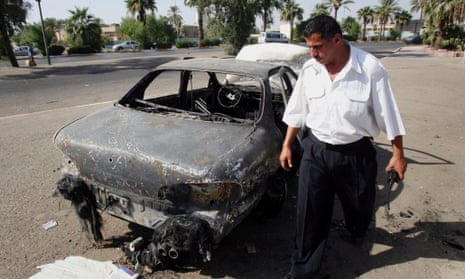From the moment three dozen unarmed civilians were gunned down in a Baghdad traffic jam by US security guards acting on a misplaced hunch they might be under attack, it was pretty clear the Nisour Square massacre was going to become one of the most controversial moments of a very controversial war.
Blackwater, the now notorious private contractor that hired them to guard US diplomats, responded that night by repainting its fleet of armoured vehicles with house paint so they would be less distinguishable to an incensed Iraqi public. Four of its staff reported the incident immediately as one of the worst atrocities of the war and investigators from the FBI compared it to the My Lai massacre in Vietnam.
Whether the men in convoy Raven 23 would be held accountable for the slaughter was another matter. Although their company was booted out of Iraq and had to pay compensation to the families of 17 killed and 20 seriously wounded by its machine guns and grenades, the track record of prosecuting Americans for war crimes carried out abroad suggested little hope of any further legal remedy.
A six-year military prosecution involving US marines accused of a similar massacre in Haditha ended with none of the soldiers sentenced to jail. And attempts to prosecute the Blackwater guards through US civilian courts relied on a little-used law governing contractors working only for the military not the State Department, something that was initially thrown out by the first trial judge due to botched evidence-gathering methods.
But, seven years on from the tragedy, the successful conviction on Wednesday of four Blackwater employees under 32 counts of manslaughter, murder, attempted manslaughter and weapons charges is likely to mark a watershed in accountability in war zones, according to some legal experts.
“This was a sensational event: even at the time it happened, people realised there were going to be big implications from the get-go,” says Professor James Stewart, a former UN war crimes prosecutor who followed the case. “There was not much doubt whether the attack was legitimate or the firepower excessive, but the trial became a whodunnit: an attempt to convince the jury that each of the men were responsible for each of the killings.”
It took 28 days of deliberation spread over nearly two months for the 12 jurors to come to a verdict, and even then, three of the manslaughter charges against one defendant resulted in a hung jury.
The four defendants displayed little emotion as they sat in court to hear the lengthy verdicts read out, but are likely to face much of the rest of their lives in prison as a result of stiff sentencing guidelines for the charges that stuck.
In Iraq, the reaction was said to be muted, with evening new broadcasts leading instead with the ongoing struggle against Islamist insurgents, although a lawyer for the Nisour Square families described them as “pleased” with the result. “The verdict is significant because it shows that paramilitary contractors who commit crimes abroad can be held accountable for their criminal actions,” Paul Dickinson told the Wall Street Journal.
Whether one trial can rehabilitate Washington’s reputation for overseas accountability overnight seems doubtful, especially as it is still now obstructing efforts to investigate torture carried out by the CIA during the war.
But some commentators argue the result in the Blackwater trial, does at least draw a line in the sand for acceptable use of force in future. “I think this trial has reflected well on America,” concludes Professor Stewart, a New Zealander with wide experience of war crimes trials now working at the University of British Columbia in Canada. “There are not that many countries in the world where a group of men working for the government like this would have been held accountable in a criminal trial back home.”
